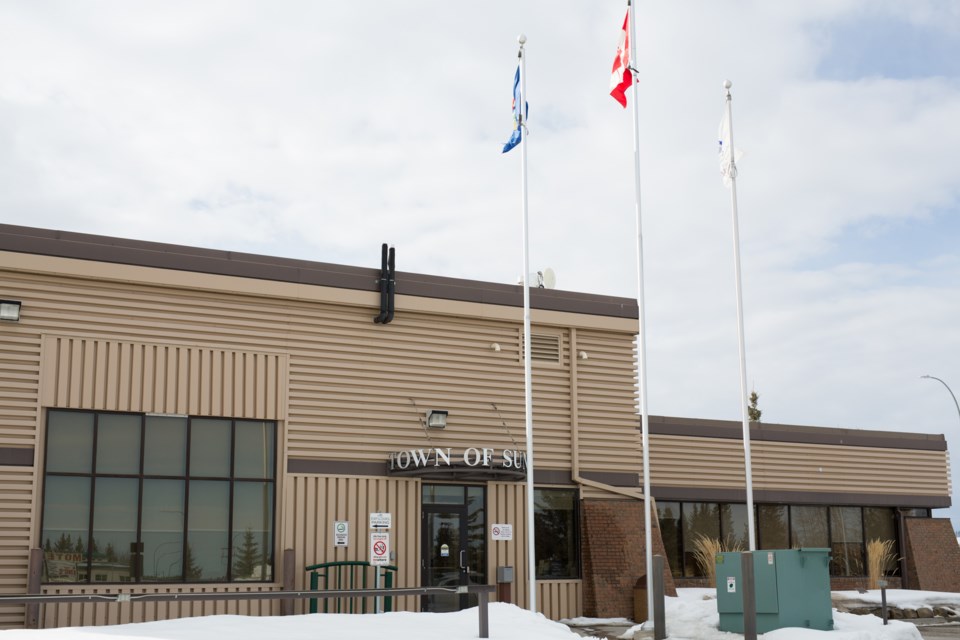SUNDRE – The municipality’s updated 2023-26 four-year budget cycle for the year ahead is forecasting a cash expenditure increase of approximately $120,000.
Total cash expenditures in 2025 are budgeted at roughly $9.86 million, up a bit from last year’s approximately $9.74 million.
In 2023, total cash expenditures were almost $9.07 million. By 2026, they are expected to increase to nearly $9.94 million.
Meanwhile, total cash revenues for next year are estimated at $5.45 million compared with $5.35 million in 2024 and $5.11 million in 2023 and a forecast of $5.46 million in 2026.
Following extensive budget deliberations during the Nov. 25 meeting, council officially re-affirmed on Dec. 2 the four-year budget as updated.
Changes discussed on Nov. 25 that were incorporated into the budget presented and approved on Dec. 2 included increasing the bylaw officer’s position to full-time hours, a modest funding boost to the Sundre and District Historical Society, as well as reducing to $150,000 from $200,000 a previously planned allocation to the Municipal New Projects restricted surplus account in 2025.
Per background information outlined by administration in council’s Dec. 2 agenda package that also includes the budget – available in-full on the town’s website – cash requirements are estimated to increase by 0.26 per cent in 2025 and 1.66 per cent in 2026.
Chris Albert, director of corporate services, emphasized that what is presented in the budget does not directly coincide with what the tax rate that council determines in April will be as there are other factors to consider.
For example, last year council decided to slightly shift the ratio between residential and non-residential taxes more toward the latter, and although costs in 2025 and 2026 have remained relatively stable, some sources of revenue have declined, he said.
“We’re expecting to collect less interest income, which unfortunately then translates to having to increase the tax burden a little bit more.”
Also factored into the updated 2025 budget forecast was opening the gated access to the Greenwood Park’s community gazebo for year-round use, he said.
“The cost of snow clearing is estimated to be about $200 per event, so it will have minimal impact within the existing budget confines,” he said.
And although funds have been allocated in 2026 to upgrade the washroom facility so it can be used year-round, it will not be accessible this winter. But once the washroom is open year-round after 2026, it is estimated that the operating costs would be approximately $800 per month of staff time, which is within existing staffing hours, he said.
Albert also cautioned that the savings from reducing the transfer into reserves by $50,000 could end up being negated by “other burdens that will also eat up those cost savings, whether it’s provincial costs that are downloaded or other costs that are increasing or other initiatives that council will want to put in place.”
With total operating cash expenditures of about $9.86 million and roughly $9.94 million as well as total operational revenues of some $5.45 million and $5.46 in 2025 and 2026 respectively, that left the remaining $4.40 million and $4.48 million in 2025 and 2026 respectively to be funded through taxation, the Fortis franchise fee, Municipal Sustainability Initiative grant funding, as well as restricted surplus accounts where identified.
Coun. Owen Petersen said he is “a fan of this budget. To me, this is a budget that speaks to the priorities of this council, which is a lot of infrastructure – a lot of roads, a lot of pipes in the ground.
“We’re putting a lot of money in the bank to continue to fix those pipes and those roads in the coming years.”
Following a brief discussion, council unanimously approved the updated budget.
Short-term saving or long-term roll of the dice?
Mayor Richard Warnock had during the Nov. 25 discussion made the case to reduce the amount going to reserves as the municipality had successfully installed new water and sewage pipes in the ground that he argued would produce cost savings as a result of fewer leaks and infiltration, while still ensuring a substantial allocation to reserves for future projects.
Albert said that while that would provide a short-term benefit in 2025, it could lead to detrimental ripple effects going into 2026 as there among other considerations remained uncertainty as to how much would be saved in water treatment and sewage.
“We will probably not see that immediately,” he said, adding reduced water losses also won’t affect staffing levels required to create potable water and treat wastewater.
Savings, he elaborated, would largely manifest in the form of reduced cost of materials such as chemicals and hazarded a guess of perhaps $20,000 in lower expenses for the water department.
Coun. Chris Vardas spoke against the mayor’s motion to reduce the allocation to reserves, citing a concern about past councils attempting similar approaches that ultimately backfired.
“It ended up biting them in the butt later on down the road,” said Vardas, adding he felt the move was a gamble.
In the event an emergent issue should arise putting the municipality in a bind, the incoming council could find itself faced with little choice but a steeper tax increase, he said.
But the mayor’s motion on Nov. 25 ultimately passed with Vardas and Petersen opposed.



